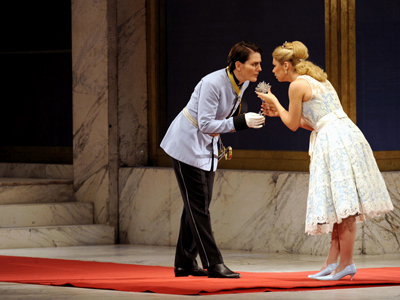
By ANDREW POWELL
Published: November 8, 2012
MUNICH — Johannes Brahms came here in 1870, catching the completed half of Wagner’s Ring and hobnobbing with colleagues, Liszt among them. He basked in new celebrity, his German Requiem having appeared in print a year earlier. The visit ended with a few days’ repose at Lake Würm, nearby.
He came again three years later. Der Ring remained incomplete, but in any case he sought other things: a meeting with poet Paul Heyse, guidance on writing for orchestra from conductor Hermann Levi (whose brother ran his asset portfolio), and more time at the deep tranquil lake (pictured), with its southward vistas to the Alps. Levi duly helped in the city, and the composer checked in in May for a four-month lakeside stay in the fishing village of Tutzing, lately reachable from downtown by train.
Brahms: “Tutzing is prettier than recently imagined … . The lake is usually blue, but a deeper blue than the sky … also the chain of snowy mountains — one cannot stop looking at them.”
Tutzingers take pride in this Brahms connection. It produced the Haydn Variations and gave life to the two long-stalled, minor-key string quartets. At a stretch, you could say the sojourn nudged Brahms over thresholds in both his orchestral and chamber music. It saw too the premiere of the Acht Lieder und Gesänge, Opus 59.
Settled in the 6th century by families called Tozzi and Tuzzo, Tutzing sports a lakeshore Brahms promenade, a Brahms memorial, a Brahms apothecary and, not so inevitably, a Brahms festival.
This last, dubbed Tutzinger Brahmstage, had an abortive start in the 1950s on the initiative of anti-Semite and “pronounced National Socialist” pianist Elly Ney. Later, much later, artist manager Christian Lange put the festival on an annual fall footing with modest strata of local government support. Sometime in between, Lake Würm officially became “Lake Starnberg.”
But music festival visitors to handsome Tutzing face a number of ponderables. A walk of homage along the spectacular promenade, for instance, finds the composer honored in flat stone between lake and Alpine view benches, a pleasing effect until you turn and see, lurking just feet away, a grand memorial to the Nazi pianist with high bronze bust and trellised garden.
Choosing when to visit confronts the problem of five events spread around three weekends, not the Ojai-like “days” timeframe suggested by the festival name. (A Carl Orff Festival in the next municipality, where that composer is buried, does better in this regard and supports its local hotels.)
Then there is the matter of programming. Tutzinger Brahmstage 2012, which has just ended amid blazes of fall color and a run of blue skies, favored rings around the composer in place of any survey. Mostly Brahms it was not. Brahms and jazz (a concert on Oct. 18) go together like Mahler and reggae. The lone string chamber work offered, the G-Major Sextet (Oct. 14), got lumped with an unneeded reduction for the same forces of Beethoven’s Pastorale Symphony. Baritone Michael Volle diluted his Liederabend (Oct. 21) with warhorses of Mahler, lessening the time to explore Brahms’s vaster output for voice.
On Oct. 26, though, festive impulses and programming logic coalesced nicely. Someone had recalled that Brahms wrote organ music and had invited Vienna-based Renate Sperger to play the 3,000-pipe, 28-year-old Sandtner organ of Tutzing’s neo-Baroque St Joseph’s Church, an instrument with ripe sound and tight, unobtrusive action.
Her program contrasted Johann Nepomuk David’s quasi-cartoonish 1947 Partita on Es ist ein Schnitter, improbably a heartfelt tribute to a friend he lost in combat, with a row of Brahms chorale preludes. Six of these, concluding with O Welt, ich muß dich lassen, were from Opus 122, the chiseled and ashen collection penned a year before the composer died. At midpoint came Brahms’s early but resolute Prelude and Fugue in A Minor, WoO 9 (1856), while two Bach staples — the Fantasia and Fugue in G Minor, BWV 542, and the Toccata and Fugue in D Minor, BWV 565 — framed the evening.
Sperger traced the excesses of the David with calm efficiency and savored introspection in the chorale preludes, abetted by Sandtner’s suave apparatus. In the Bach pairings, she wrought requisite thunder and scaled the quilted fugal flights with unbroken legerdemain.
On the evidence of this year, Tutzinger Brahmstage holds potential in reserve, not least for local businesses. Brahms’s music, particularly the vocal and chamber scores, suits an intimate meeting place, and Tutzing has an authentic claim as a host town, with viable concert venues in St Joseph’s Church and the Evangelische Akademie, its idyllically sited former palace. A focused few days and a sculptural clean-up on the promenade could work wonders.
After leaving Tutzing and Munich in 1873, Brahms returned home to Vienna. There he led the Philharmonic in the November premiere of the Haydn Variations, an orchestral triumph from which he never looked back.
The next month he was once more in Bavaria, to pick up mad King Ludwig II’s Maximilian Medal for Art and Science. Wagner got his at the same time. Who knew? Perhaps Ludwig thought equally highly of both of them.
Photo © Tourismusverband Fünf-Seen-Land
Related posts:
Tutzing Returns to Brahms
A Stirring Evening (and Music)
Kaufmann, Wife Separate
Zimerman Plays Munich
Widmann’s Opera Babylon

Brahms Days in Tutzing
Thursday, November 8th, 2012By ANDREW POWELL
Published: November 8, 2012
MUNICH — Johannes Brahms came here in 1870, catching the completed half of Wagner’s Ring and hobnobbing with colleagues, Liszt among them. He basked in new celebrity, his German Requiem having appeared in print a year earlier. The visit ended with a few days’ repose at Lake Würm, nearby.
He came again three years later. Der Ring remained incomplete, but in any case he sought other things: a meeting with poet Paul Heyse, guidance on writing for orchestra from conductor Hermann Levi (whose brother ran his asset portfolio), and more time at the deep tranquil lake (pictured), with its southward vistas to the Alps. Levi duly helped in the city, and the composer checked in in May for a four-month lakeside stay in the fishing village of Tutzing, lately reachable from downtown by train.
Brahms: “Tutzing is prettier than recently imagined … . The lake is usually blue, but a deeper blue than the sky … also the chain of snowy mountains — one cannot stop looking at them.”
Tutzingers take pride in this Brahms connection. It produced the Haydn Variations and gave life to the two long-stalled, minor-key string quartets. At a stretch, you could say the sojourn nudged Brahms over thresholds in both his orchestral and chamber music. It saw too the premiere of the Acht Lieder und Gesänge, Opus 59.
Settled in the 6th century by families called Tozzi and Tuzzo, Tutzing sports a lakeshore Brahms promenade, a Brahms memorial, a Brahms apothecary and, not so inevitably, a Brahms festival.
This last, dubbed Tutzinger Brahmstage, had an abortive start in the 1950s on the initiative of anti-Semite and “pronounced National Socialist” pianist Elly Ney. Later, much later, artist manager Christian Lange put the festival on an annual fall footing with modest strata of local government support. Sometime in between, Lake Würm officially became “Lake Starnberg.”
But music festival visitors to handsome Tutzing face a number of ponderables. A walk of homage along the spectacular promenade, for instance, finds the composer honored in flat stone between lake and Alpine view benches, a pleasing effect until you turn and see, lurking just feet away, a grand memorial to the Nazi pianist with high bronze bust and trellised garden.
Choosing when to visit confronts the problem of five events spread around three weekends, not the Ojai-like “days” timeframe suggested by the festival name. (A Carl Orff Festival in the next municipality, where that composer is buried, does better in this regard and supports its local hotels.)
Then there is the matter of programming. Tutzinger Brahmstage 2012, which has just ended amid blazes of fall color and a run of blue skies, favored rings around the composer in place of any survey. Mostly Brahms it was not. Brahms and jazz (a concert on Oct. 18) go together like Mahler and reggae. The lone string chamber work offered, the G-Major Sextet (Oct. 14), got lumped with an unneeded reduction for the same forces of Beethoven’s Pastorale Symphony. Baritone Michael Volle diluted his Liederabend (Oct. 21) with warhorses of Mahler, lessening the time to explore Brahms’s vaster output for voice.
On Oct. 26, though, festive impulses and programming logic coalesced nicely. Someone had recalled that Brahms wrote organ music and had invited Vienna-based Renate Sperger to play the 3,000-pipe, 28-year-old Sandtner organ of Tutzing’s neo-Baroque St Joseph’s Church, an instrument with ripe sound and tight, unobtrusive action.
Her program contrasted Johann Nepomuk David’s quasi-cartoonish 1947 Partita on Es ist ein Schnitter, improbably a heartfelt tribute to a friend he lost in combat, with a row of Brahms chorale preludes. Six of these, concluding with O Welt, ich muß dich lassen, were from Opus 122, the chiseled and ashen collection penned a year before the composer died. At midpoint came Brahms’s early but resolute Prelude and Fugue in A Minor, WoO 9 (1856), while two Bach staples — the Fantasia and Fugue in G Minor, BWV 542, and the Toccata and Fugue in D Minor, BWV 565 — framed the evening.
Sperger traced the excesses of the David with calm efficiency and savored introspection in the chorale preludes, abetted by Sandtner’s suave apparatus. In the Bach pairings, she wrought requisite thunder and scaled the quilted fugal flights with unbroken legerdemain.
On the evidence of this year, Tutzinger Brahmstage holds potential in reserve, not least for local businesses. Brahms’s music, particularly the vocal and chamber scores, suits an intimate meeting place, and Tutzing has an authentic claim as a host town, with viable concert venues in St Joseph’s Church and the Evangelische Akademie, its idyllically sited former palace. A focused few days and a sculptural clean-up on the promenade could work wonders.
After leaving Tutzing and Munich in 1873, Brahms returned home to Vienna. There he led the Philharmonic in the November premiere of the Haydn Variations, an orchestral triumph from which he never looked back.
The next month he was once more in Bavaria, to pick up mad King Ludwig II’s Maximilian Medal for Art and Science. Wagner got his at the same time. Who knew? Perhaps Ludwig thought equally highly of both of them.
Photo © Tourismusverband Fünf-Seen-Land
Related posts:
Tutzing Returns to Brahms
A Stirring Evening (and Music)
Kaufmann, Wife Separate
Zimerman Plays Munich
Widmann’s Opera Babylon
Tags:Brahms, Brahms Days, Brahmstage, Christian Lange, Commentary, Elly Ney, Evangelische Akademie, Haydn Variations, Hermann Levi, Johann Nepomuk David, King Ludwig II, Lake Starnberg, Michael Volle, München, Munich, Nazi Germany, Renate Sperger, Review, Schloß Tutzing, Tutzing
Posted in Munich Times | Comments Closed